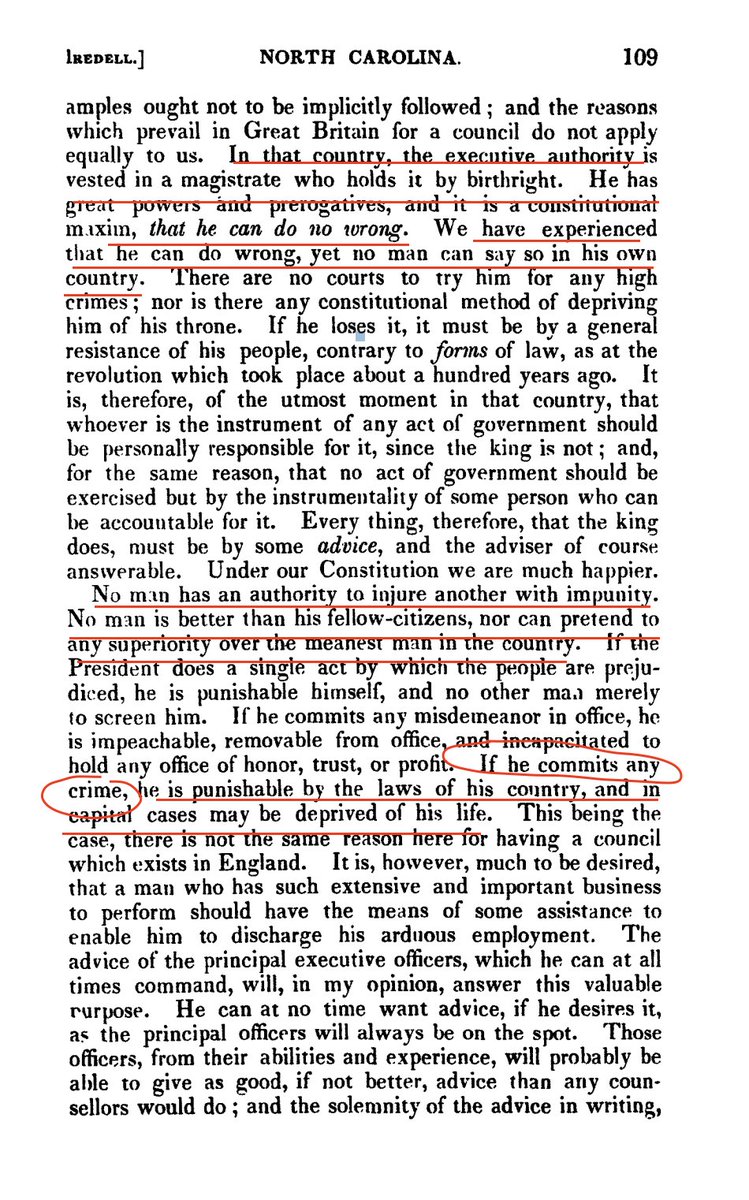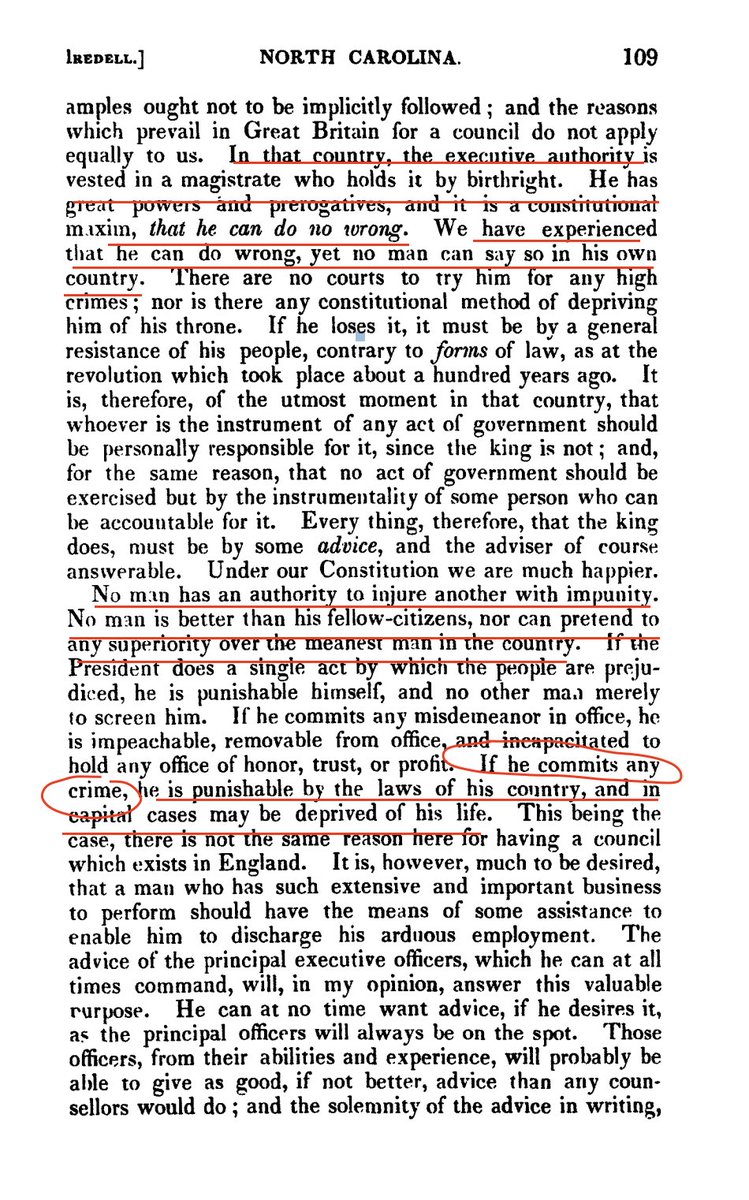I'm interrupting my 2-month Twitter hiatus b/c I've just found a highly relevant speech from the Ratification debates (1788):
Against Presidential Immunity & Unitary Executive theory (interpreting the Opinions Clause).
Future SCOTUS Justice Iredell, NC Convention, 7/28/1788:



Against Presidential Immunity & Unitary Executive theory (interpreting the Opinions Clause).
Future SCOTUS Justice Iredell, NC Convention, 7/28/1788:



2/
From Elliot's Ratification Debates, Vol. 4, p. 108-110.
NC Delegate James Iredell, SCOTUS Justice 1790-1799:
On presidential criminal liability, to explain the Opinions Clause vs. a British cabinet, he first explains that a president is (obviously) different from the King:
From Elliot's Ratification Debates, Vol. 4, p. 108-110.
NC Delegate James Iredell, SCOTUS Justice 1790-1799:
On presidential criminal liability, to explain the Opinions Clause vs. a British cabinet, he first explains that a president is (obviously) different from the King:

3/ The king is immune from criminal & civil liability, so cabinet ministers stand in for the king to face criminal and political liability.
But in the republican Constitution, the president is (obviously) civilly & criminally liable, and his accountability should be made clear:
But in the republican Constitution, the president is (obviously) civilly & criminally liable, and his accountability should be made clear:

4/ Iredell, N.C. Convention, on official Pres acts:
“If the President does a single act by which the people are prejudiced, he is punishable himself…
If he commits any crime, he is punishable by the laws of his country, and in capital cases may be deprived of his life.”
“If the President does a single act by which the people are prejudiced, he is punishable himself…
If he commits any crime, he is punishable by the laws of his country, and in capital cases may be deprived of his life.”

5/ But wait, there's more:
This passage shows the opposite of the Unitary Executive theory.
Iredell reflects an obvious, common sense understanding of the Opinions Clause:
*The principal officers of the Departments are independent of presidential control.*
Iredell, p. 108:
This passage shows the opposite of the Unitary Executive theory.
Iredell reflects an obvious, common sense understanding of the Opinions Clause:
*The principal officers of the Departments are independent of presidential control.*
Iredell, p. 108:

6/ This confirms what I've also found from the First Congress in interpreting the Opinions Clause. More to come on this soon in my updated paper on Freehold Offices vs. Despotic Displacement.
papers.ssrn.com/abstract=45211…
papers.ssrn.com/abstract=45211…
7/ My updated @ssrn draft here on the Unitary Executive theory (i.e., nonsense ideological "vibe originalism") and how the Founders had the same common-sense reading of the Opinions Clause with which we've been refuting the unitary theory for years:
ssrn.com/abstract=45211…

ssrn.com/abstract=45211…

8/ Highly relevant:
Iredell is evidence against Team Trump's theory of prosecution ONLY after impeachment/removal.
Iredell does not say "impeachment, then prosecution."
Two independent sentences here:
1. Impeach & disqualify
2. Prosecute
The "And/Or" is clearly implied:
Iredell is evidence against Team Trump's theory of prosecution ONLY after impeachment/removal.
Iredell does not say "impeachment, then prosecution."
Two independent sentences here:
1. Impeach & disqualify
2. Prosecute
The "And/Or" is clearly implied:

9/ Note: Iredell thinks it’s obvious that “misdemeanors” lead to impeachment and disqualification, while “crimes” would be prosecuted - overlapping but separate processes.
Iredell thinks this is obvious as legal background before he makes his actual argument about cabinets.
Iredell thinks this is obvious as legal background before he makes his actual argument about cabinets.
@JostSteve Working *on* it. So many flagrant and huge errors by “originalists”, and so many messes created by the Roberts Court in so many dangerous areas, it’s tough to finish this book.
10/ @ilan_wurman doesn't get my point & says the Iredell passage is "already well known."
1) On presidential crim liability, true: Prakash & @ProfBrianKalt discussed it in Texas L Rev 2021. I hadn't seen it in this litigation.
2) But on unitary theory?...
1) On presidential crim liability, true: Prakash & @ProfBrianKalt discussed it in Texas L Rev 2021. I hadn't seen it in this litigation.
2) But on unitary theory?...
https://x.com/ilan_wurman/status/1745956203983986913?s=20
@ilan_wurman @ProfBrianKalt 11/ I just searched Westlaw & Google, and it seems no one has quoted any part of the passage I've highlighted here:
The president and the department heads "might otherwise have colluded, and opinions have been given with too much under his influence."
The president and the department heads "might otherwise have colluded, and opinions have been given with too much under his influence."
https://x.com/ilan_wurman/status/1745956203983986913?s=20
@ilan_wurman @ProfBrianKalt 12/ One underlying assumption of the Iredell's 3-page section is that the president and dept heads are independent of each other. This sentence makes this point more explicitly. And that's a new source for the common sense point, @ilan_wurman
@ilan_wurman @ProfBrianKalt 13/ My reply to @ilan_wurman, who said he didn’t understand my interpretation of Iredell as evidence for Department Heads’/principal officers’ decisional and structural independence from the President, as part of Iredell’s argument for presidential criminal liability:
https://twitter.com/jedshug/status/1746899030125220147
• • •
Missing some Tweet in this thread? You can try to
force a refresh






